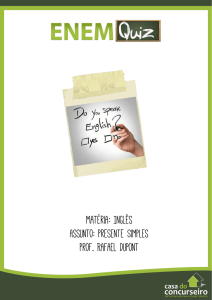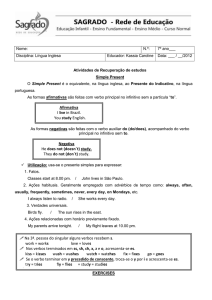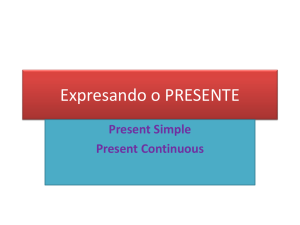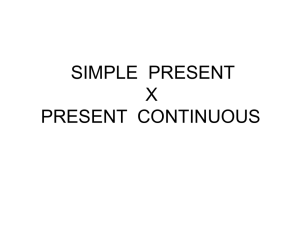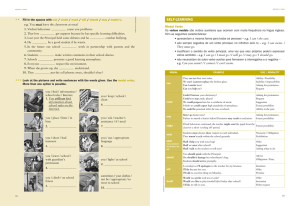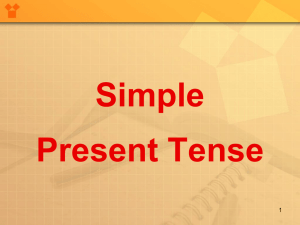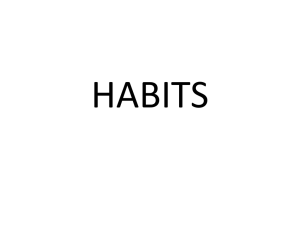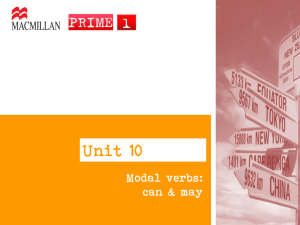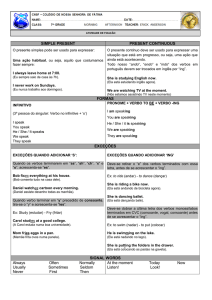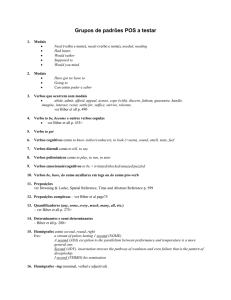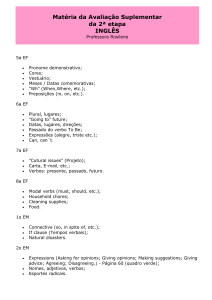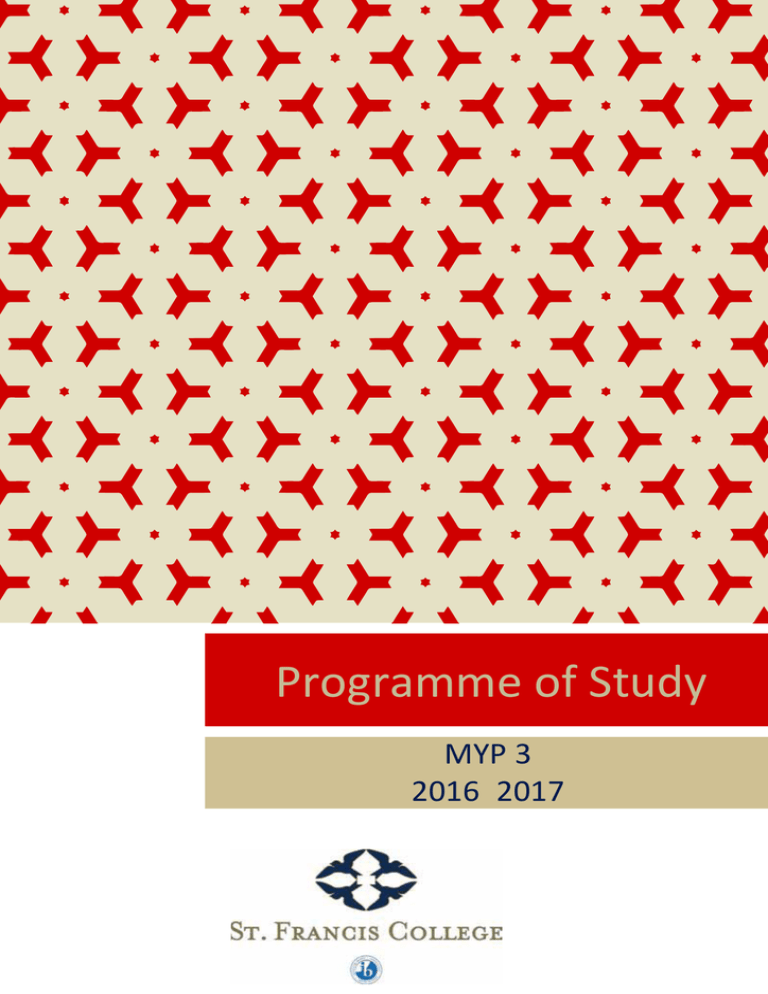
Programme of Study
MYP 3
2016_2017
St. Francis College | Programme of Study | MYP 3
TABLE OF CONTENT
Language & Literature English
Language & Literature Portuguese
Language & Literature Spanish
Language & Literature Japanese
Language & Literature Korean
Language Acquisition French
Language Acquisition Spanish
Language Acquisition Portuguese
Mathematics
Sciences
Humanities
História & Geografia
Visual Art
Drama
Music
Design
Physical & Health Education
2
3
St. Francis College | Programme of Study | MYP 3
LANGUAGE & LITERATURE ENGLISH
The MYP 3 English curriculum aims to develop the skills of reading, writing,
speaking, listening and viewing using an integrated approach. The literary text
constitutes the core of each unit’s activities and assessment. The works chosen
will be from different parts of the world and will include male and female
authors. Texts used will explore and challenge stereotypical gender and cultural
roles. Student selected independent reading is expected and integral to
developing vocabulary, writing skills, and improving grammar.
Unit one: Short Stories
●
●
●
●
Read and respond to the stories through discussions and writing
write a new or missing scene for a short story
examine the short story format through Vonnegut´s format
Practise analytical skills (PEE)
Unit Two: Romeo and Juliet
●
●
●
●
●
●
Genre: Short Stories
Genre: Drama
Read sections from the play
learn about themes and characters as a literary construct
identify motifs and symbolism in the play
perform importnant passages
use the text to spur creative writing
develop analytical skills (PEE)
● Unit three: The Curious Incident of the Dog in the NIght Time
Novel
● Read and respond to the novel in class and individually
● Write a text response essay based on the novel
● Perform an oral presentation
Unit four: Poetry
●
●
●
●
●
Write about the language and layout of poems
Write your own poetry to arouse curiosity and emotions
Learn particular forms of poetry from other countries
Read poetry for pleasure
Role play and perform poetry for an audience
Genre:
St. Francis College | Programme of Study | MYP 3
LANGUAGE & LITERATURE PORTUGUESE
1.
Estudo da Língua – Língua e Discurso: Aspectos de leitura e
interpretação:
I.
Diferentes gêneros textuais com foco nos atos de
contar, relatar (U2), descrever, argumentar, registrar e informar (U3):
conto (U1, 2), crônica (U1, 2), romance (U2) e poesia (U1,4); notícia
(U2), reportagem (U2), entrevista, editorial, relatório (U3) (inclusive
em mídias digitais).
II.
Competências:
a)
Apreensão de sentidos explícitos, implícitos e intuitivos e fluência
de leitura; (U4)
b)
Seleção, reorganização, recorte e interpretação de informações
(U3);
c)
Consciência de composição textual – construção e estrutura (U3):
d)
Apreensão e análise de estilo:
· Figuras de linguagem: figuras de palavra: metáfora, metonímia,
catacrese, antonomásia, sinestesia (U4);
· Recursos de Persuasão: exposição, argumentação e informação
(U3);
e)
Questões de gêneros literários e não literários:
· A estrutura da narração – elementos (foco narrativo, tempo,
espaço, enredo e personagem) (U2);
· Análise do enredo (U2);
· Categorias narrativas não literárias: reportagem, relatório,
editorial, entrevista, leitura de dados, tabelas e infográfico (U3)
2.
Estudo da Língua – Gramática – Morfossintaxe:
I.
a)
b)
Estudo do período coordenado e suas conjunções; (U1)
Estudo do período e a relação de subordinação (substantivas
desenvolvidas e reduzidas) (U2);
c)
Tipos de orações: adverbiais (desenvolvidas e reduzidas) (U3)
d)
Tipos de orações: adjetivas (desenvolvidas e reduzidas) (U4)
e)
Pronomes relativos na construção de sentidos no texto. (U4)
f)
Coesão e coerência: o domínio da escrita (U4)
g)
3.
Sintaxe:
Orações complexas (encadeamento entre coordenadas e
subordinadas) (U4).
Produção textual
4
St. Francis College | Programme of Study | MYP 3
a.
Textos com aplicação dos recursos/competências linguísticas
estudadas;
b.
Textos com foco na exposição de dados e informações e o discurso
argumentativo. (U3)
Observação: As competências são desenvolvidas por meio dos
seguintes gêneros/tipos de texto:
1.
Narrativo:
·
Contos (U1, 2);
·
Novelas; (U3)
·
Romance; (U3)
2.
Argumentação: (U3)
·
Crônica argumentativa; (U3)
·
Publicidade; (U3)
·
Editoriais (U3)
3.
Poético: (U4)
· Identificar e classificar versos, estrofes e esquema de rimas
(U4);
·
4.
Metrificação (U4);
Leitura
a) Contos Cidades mortas - Monteiro Lobato (versão eletrônica) – U2
(unidade interdisciplinar com Ciências, História e Humanities)
b) Venha ver o pôr-do-sol (Contos) - Fagundes Telles, Lygia U1
c) Contos – Machado de Assis (O caso da vara, A cartomante, A carteira, A
chinela turca– trabalhar 4 contos, no mínimo) U1
d) Janela Mágica – Cecília Meireles(U1)
e) Os miseráveis. Walcyr Carrasco (adapt.) (U3)
f) Antologia poética - José Craveirinha (U4).
LANGUAGE & LITERATURE SPANISH
Unidad 1: La literatura y la subversión de la realidad
Género
literario: el cuento fantástico
Género no literario: la biografía
● Leer, apreciar y comentar relatos fantásticos pertenecientes a diferentes
autores de la literatura hispanoamericana
● Descubrir las características del relato fantásitco: lo extraño, lo maravilloso y
lo fantástico. La verosimilitud.
● Establecer las relaciones entre el relato extraño, maravilloso y fantástico.
● Leer un texto biográfico e identificar sus características.
5
6
St. Francis College | Programme of Study | MYP 3
● Los géneros discursivos: géneros primarios y secundarios. Los géneros
literarios.
● Revisión de las clases de palabras: el pronombre y el verbo. La deixis.
● Redactar un texto biográfico.
Unidad 2: De poesías y canciones
Género literario: la poesía Género
no literario: el artículo periodístico de revista especializada
● Leer, apreciar y comentar poemas pertenecientes a diferentes autores de la
literatura hispanoamericana.
● Identificar los rasgos del texto poético: métrica, versificación, rima y figuras
retóricas.
● Establecer comparaciones entre los poemas leídos y las canciones escuchadas.
● Leer un artículo periodístico de una revista especializada e identificar sus
características.
● Los géneros discursivos: géneros primarios y secundarios. Los géneros
literarios.
● Revisión de las reglas de acentuación: diptongos, hiatos.
● Revisión de las clases de palabras: sustantivo, adjetivo, adverbio y
preposición.
● Preparar una presentación que incorpore música y poesía.
Unidad 3: Historias de novela
literario: la reseña
Género literario: la novela Género no
● Leer, apreciar y comentar una novela de un autor de la literatura española o
hispanoamericana
● Reconocer los rasgos de la novela como género literario.
● Establecer las relaciones entre el cuento, la novela y la “nouvelle”.
● Leer una reseña e identificar sus características.
● La polifonía en la novela: el discurso referido (discurso directo e indirecto).
Las transformaciones verbales y pronominales en el discurso directo e
indirecto.
● Redactar una reseña de una novela elegida por el alumno.
Unidad 4: Nota a pie de página Género literario: el ensayo
no literario: el texto expositivo didáctico
Género
● Leer, apreciar y comentar un ensayo de un autor de la literatura española o
hispanoamericana.
● Reconocer los rasgos del ensayo como género literario.
● Establecer las diferencias entre textos ficcionales y no ficcionales.
St. Francis College | Programme of Study | MYP 3
● Leer un texto expositivo e identificar sus características
● Reconocer y aplicar los conectores y marcadores de argumentación.
● Establecer las diferencias entre el lenguaje oral y el lenguaje escrito: la
adecuación del registro en los ensayos.
● Identificar el plagio. Las formas de citar las fuentes.
● Redactar un breve ensayo.
LANGUAGE & LITERATURE JAPANESE
1.
Literature – Short stories by various
authors
● Appreciation of Japanese literature in modern era and in our time
● New idioms, expressions and Chinese characters
● Writing exercise
2.
Essay – “How do you live” by Genzaburô
Yoshino
● Examination of the globalization in modern era
● New idioms, expressions and Chinese characters
● Writing exercise – summarize the texts
● Oral presentation – research on the topic and its presentation
3.
Japanese Classic Literature – “The pillow
Book” by Sei Shônagon and others
● Introduction of Japanese classic literature – its history and important
works
● Introduction of classic language – its style and grammar
● Words and expressions in classic language
● Genre of texts – interpretation in modern language and comics
4.
Poetry by various authors
● Appreciation of poetry
● Learning of rhetoric
● Writing poetry
5.
Writing
● Basic of writing – organize what you want to write
● Write your favourite things
●
LANGUAGE & LITERATURE KOREAN
Unit One: 학습용어 배우기
•글의 종류, 구성
•문장의 종류, 문체의 종류, 문법과 관련된 용어, 시험 관련 용어
•언어의 다의어=> 중의성
7
8
St. Francis College | Programme of Study | MYP 3
•맞춤법에 의핚 핚글표기와 발음
•언어의 본질=> 타 언어와의 상관관계
Unit Two: • 갈래 학습: 문학의 장르 ->시, 소설, 수필, 희곡, 시나리오…
•글의 종류: 설명문, 보고서, 건의문, 기사문, 광고문
Unit Three: • 문법 => 품사, 사동, 피동, 지시어
•관용표현
•매체와 언어
Unit Four: 작문지도
•글의 전개 방법및 표현방법
•속담, 핚자성어
•문학작품 선정하여 읽기=> 독서 지도
LANGUAGE ACQUISITION FRENCH
On communique !
Genre: email and letter
Talk about the holidays.
Talk about communication tools.
Discuss about the impact of different communication tools in our lives.
Learn expressions used in conversations by telephone.
Find out about the relationship between the abbreviation in text
messages and the words’ pronunciation.
● Learn the structure and the language of an email.
● Find out the means of communication evolution.
●
●
●
●
●
Les grands personnages qui ont fait la France.
●
●
●
●
●
Genre: biography, blog
Learn about some famous French people and their achievements.
Describe psychologically and physically, a person.
Describe facts in the past.
Write a short biography.
Imagine and write a famous French person’s blog.
Tout peut changer
Genre: essay, presentation
● Find out about the French Republic symbols and the French Revolution.
● Compare people’s life before and after the French Revolution.
● Compare Paris during the French Revolution and nowadays using the past
tense.
9
St. Francis College | Programme of Study | MYP 3
● Discuss the concept of change and share which changes are needed
nowadays.
Miroir, miroir joli
Genre: drama
Talk about healthy habits and physical appearance.
Talk about beauty stereotypes and self-image.
Use expressions to give advices.
Compare beauty standards throughout the time and cultures using the
past tense.
● Read, understand and play an adapted version of a classical play in
French.
●
●
●
●
LANGUAGE ACQUISITION SPANISH
Unidad 1: La comunicación
textual: la carta y el correo electrónico
Género
● Leer, comprender y analizar las convenciones de correos electrónicos y
cartas informales.
● Responder a cartas, correos electrónicos y mensajes de texto contando de
forma sencilla los hechos producidos en un determinado contexto.
● Obtener y proporcionar información sobre acontecimientos del pasado.
● Expresar valoraciones, gustos y opiniones.
● Escuchar, comprender e identificar ideas principales de conversaciones
telefónicas y realizar actividades de comprensión relacionadas.
● Participar en conversaciones telefónicas formales e informales en
situaciones familiares de forma improvisadas o no.
● Proponer actividades de ocio y concertar una cita para realizarlas.
Unidad 2: Hechos y protagonistas del mundo hispano
la biografía
Género textual:
● Aproximarse a las grandes figuras y los hechos históricos que marcaron el
mundo hispano.
● Obtener y proporcionar información sobre hechos pasados vinculados o
no con el presente.
● Leer, comprender y analizar la estructura de la biografía.
● Obtener y seleccionar información sobre la vida de personajes históricos
para la elaboración de biografías breves.
● Escuchar, comprender e identificar las ideas principales de noticias en
formato audiovisual.
10
St. Francis College | Programme of Study | MYP 3
● Relatar de forma escrita y oral hechos y circunstancias del pasado
descrbiendo, personas, cosas y lugares.
● Organizar hechos del pasado diacrónicamente utilizando tiempos del
pasado adecuados y marcadores de tiempo.
Unidad 3: Memoria y silencio
textual: la canción política y el eslogan
Género
● Leer, comprender e identificar las ideas principales y secundarias de
noticias y eslóganes. .
● Relatar los hechos principales, narrando los sucesos, describiendo las
circunstancias y realizando valoraciones.
● Debatir sobre hábitos, costumbres y patrones del comportamiento en el
pasado.
● Escuchar, comprender e interpretar canciones políticas.
● Comprender, analizar y extraer conclusiones a partir de textos visuales y
escritos.
● Realizar presentaciones y elaborar informes breves.
● Resumir fragmentos y pedir aclaraciones a partir de presentaciones.
Unidad 4: Espejito Espejito
el prospecto y el anuncio
Género textual:
● Describir detalladamente a una persona proporcionando información
sobre rasgos físicos y de carácter.
● Leer, comprender prospectos de medicamentos y realizar actividades de
comprensión.
● Proporcionar y obtener información acerca de sensaciones, percepciones
físicas y estados de ánimo.
● Seguir y dar consejos para solucionar problemas personales y de salud.
● Participar en conversaciones informales sobre temas cotidianos y de
actualidad, siendo capaz de manifestar acuerdo y desacuerdo.
● Visualizar, comprender e interpretar anuncios de productos de belleza y
realizar actividades de comprensión.
● Elaborar un anuncio.
LANGUAGE ACQUISITION PORTUGUESE
O curso visa atender às necessidades emergentes do aluno que acaba de entrar
em contato com uma nova língua e uma nova cultura. Objetivamos:
● Desenvolver habilidades para que o aluno que está entrando em contato pela
primeira vez com a língua portuguesa possa utilizá-la de maneira satisfatória
em diferentes contextos sociais.
St. Francis College | Programme of Study | MYP 3
● Explorar as competências linguísticas intermediárias, avançando no
conteúdo e na gramática da língua, fazendo com que o aluno caminhe para
ser inserido em ambientes acadêmicos onde a língua portuguesa é o
instrumento de estudo.
O curso é dividido em fases.
Fase 1
Unidade 1 - Fazendo apresentações
●
●
●
●
●
●
●
●
●
●
●
●
●
●
●
●
●
●
●
●
●
●
●
●
●
Expressões de sobrevivência em sala de aula (com material escolar)
Cumprimentos e despedidas formais e informais
Pronomes pessoais do caso reto
Pronomes de tratamento você, o senhor, a senhora
Alfabeto
Verbo “ser” no presente do indicativo
Pronomes possessivos: meu(s), minha(s), seu(s), sua(s), nosso(s), nossa(s),
dele(s), dela(s)
Profissões no masculino/feminino/singular/plural: escritor, professor,
aluno, secretária, engenheiro, dentista, motorista, advogado
Nacionalidades no masculino/feminino/singular/plural: francês, argentino,
brasileiro, chinês, japonês, espanhol, coreano.
Países
Pronomes demonstrativos: este(s) como sinônimo de esse(s), esta(s) como
sinônimo de essa(s), isto como sinônimo de isso, aquele(s), aquela(s) e
aquilo.
Números (0 – 1000)
Verbos regulares terminados em “ar” (gostar, precisar, ligar, telefonar,
conectar, morar) “er”, “ir” no presente do indicativo
Preposição em, na e no com o verbo “morar”
Vocabulário de família: pai, mãe, marido, esposa/mulher, filho, filha, irmão,
irmã, avó, avô.
Vocabulário: amigo, amiga, colega, namorado, namorada.
Perguntas pessoais
Rotinas diárias
Verbo “poder”, “querer” no presente do indicativo.
Cores
Horas
Parlenda “1, 2 feijão com arroz”
Comidas básicas (leite, pão, refrigerante, suco, arroz, carne, peixe, frango,
água, macarrão, ovo, salada)
Matérias da escola
Esportes
Unidade 2- Conversando nos locais que frequento
● Vários locais e o que fazer em cada um deles (academia – fazer ginástica,
parque – andar, correr, cinema – assistir filme, teatro – assistir peça, ponto
de ônibus – esperar o ônibus)
11
St. Francis College | Programme of Study | MYP 3
●
●
●
●
●
●
●
●
●
●
●
●
●
●
●
●
●
●
●
●
●
●
●
●
●
●
Comprar remédio na farmácia.
Conversa ao telefone (pegar recado)
Conversa no taxi
Pedir e dar sugestão de comidas em restaurantes.
Vocabulário básico de utensílios de mesa (prato, copo, garfo, etc)
Convidar para ir ao restaurante
Tipos de restaurante (buffet, à la carte)
Comidas favoritas
Expressões: estar com/ ter fome, sede, calor, sono, frio, medo; estar com/ ter
vontade de
Conjunção nem....nem
Saber usar a moeda brasileira
Verbo querer no sentido de oferecer (quer um taxi?) e achar que para
expressar opinião
Situações no trabalho
Adjetivos cansado, atrasado
Revisão: dias da semana, advérbios de tempo: hoje, ontem, anteontem,
amanhã, depois de amanhã, meses do ano
Verbos: achar, comprar, telefonar, conectar, precisar, saber, poder, ter, ter
que e ir no presente do indicativo
Rotina com detalhes (hora e dia) Ex. Eu pratico ____ às ___ horas.
Advérbios de frequência (uma vez, duas vezes, com que frequência?, --- por
mês/ano/sempre/nunca/às vezes)
Onde? De onde? Qual? O quê? Quando? Quem? Cadê?
Relações familiares: expandir (tio, tia, avô, avó, prima, primo, sobrinho)
Meios de transportes + adjetivos: seguro, confortável, perigoso, rápido,
devagar, caro, barato
Verbos TER e VIR
Estar + adjetivo (simpático, antipático, complicado, inteligente, estressado,
atarefado, cansado, feliz, descansado, relaxado)
Sugestão: Por que vc não...?
Verbo saber como habilidade vs conhecer (pessoas e lugares), tocar, nadar
Verbo preferir (Vc conhece....? Vc prefere.....? Vc sabe onde é....?)
Unidade 3 Passeando no tempo
● Presente do indicativo – revisão dos verbos regulares e do verbo ser e
estudo de alguns verbos irregulares
● Pretérito perfeito ( advérbios de tempo, verbos regulares ar/er/ir e alguns
irregulares: usar jornal, biografias)
● Futuro Composto ( planos para as férias, transporte, resoluções de ano novo,
turismo, folhetos turísticos para descrever lugares)
● Partes do corpo
● doenças e tratamentos associados às viagens + sugestões( precisar + verbo)
● Ter/ precisar + comprar/ estar com / ficar com - dor de cabeça, dor de
garganta, etc)
● Verbos ir e vir
● Estar + adjetivo (simpático, antipático, complicado, inteligente, estressado,
atarefado, cansado, feliz, descansado, relaxado)
12
St. Francis College | Programme of Study | MYP 3
● Sugestão: por que você não...?
● Verbo saber como habilidade (tocar, nadar) + contraste com conhecer
pessoas e lugares
Fase 2
Unidade 1 - A casa ideal
Partes da casa
Gostaria de comprar x gosto de ...
Veja – expressão fixa (Veja estas fotos)
Ficar – localização – Onde fica....?
Advérbios de lugar – em frente a, atrás, entre, ao lado do , na esquina , na rua
Mobília – eletrodoméstico
Presente contínuo com partes da casa ( está lendo na sala, esta cozinhando
etc)
● Pronomes indefinidos – algum, alguma, nenhum, nenhuma, ligado a bairro.
No seu bairro tem algum....
Comparativo de igualdade, superioridade, inferioridade.
●
●
●
●
●
●
●
Unidade 2 - A Vida Antigamente
●
●
●
●
●
●
Descrição física e psicológica – adjetivos generoso, cruel
Pretérito imperfeito regular e irregular (ir, por, ser, ver, vir)
Revisão das cores
Vestuário social associado às situações
Vestuário esportivo e íntimo às situações
Adjetivo roupas – curto - apertado
Unidade 3 - A Importância do Passado
● Pretérito perfeito e pretérito mais que perfeito composto
● Pretérito perfeito regular e irregular (estar)
● Comparação entre o pretérito perfeito e imperfeito
Fase 3
Unidade 1
● Desinências nominais – derivação prefixal, sufixal prefixal e sufixal,
parassintética
● Desinência de superlativo sintético
● Superlativo relativo de superioridade e inferioridade – regular e irregular
● Desinência de particípio passado – ado-ido com verbo principal no presente
ou passado (é casado – era usado
● Futuro composto & futuro do presente (desinência de futuro do presente)
● Futuro do pretérito (desinência de futuro do pretérito)
● Retomar outras desinências – o pretérito imperfeito – do presente do
indicativo, do pretérito perfeitoUnidade 2
13
St. Francis College | Programme of Study | MYP 3
● Pronomes oblíquos – me, o, a, os, as, os, no, na, nos, nas, lhe, lhes, nos,
comigo, com ele, com ela, com ele, com eles, com elas, com você, com vocês,
com a gente, conosco.
● Linguagem informal – encontrar ele, convidar ela
● Saber como deixar recado ao telefone.
● Falar ao telefone na situação de trabalho
● Expressões relativas ao telefone – ocupado, caiu a ligação, acabou a bateria.
● Tipos de telefone – fixo, celular
● Discurso direto e indireto
Unidade 3
Regência verbal – pensar em, andar de, gostar de, ir a ,ser do tipo
Futuro do subjuntivo
Planos para férias + vocabulário de hotel – reserva
Problemas no hotel + roupa de banho e cama
Verbos relacionados a viagem e hospedagem- avisar, conseguir, aproveitar,
combinar, reparar+ verbos reflexivos (vestir-se, lembrar-se, queixar-se,
sentar-se, levantar-se, lavar-se, cortar-se, enxugar-se) conectados a
hospedar-se
● Tipos de souvenir com materiais – criar texto sobre algo típico do Brasil +
haver no sentido de existir Ex: Em São Paulo há muitos prédios.
●
●
●
●
●
Fase 4
Unidade 1
●
●
●
●
●
●
●
●
●
●
●
Regência verbal – pensar em, andar de, gostar de, ir a ,ser do tipo
Futuro do subjuntivo
Planos para férias + vocabulário de hotel – reserva
Problemas no hotel + roupa de banho e cama
Verbos relacionados a viagem e hospedagem- avisar, conseguir, aproveitar,
combinar, reparar+ verbos reflexivos (vestir-se, lembrar-se, queixar-se,
sentar-se, levantar-se, lavar-se, cortar-se, enxugar-se) conectados a
hospedar-se
Tipos de souvenir com materiais – criar texto sobre algo típico do Brasil +
haver no sentido de existir Ex: Em São Paulo há muitos prédios.
Imperfeito do subjuntivo
Presente do subjuntivo
Vocabulário sobre partes do carro
Vocabulário sobre desastres naturais
Vocabulário sobre casamento. (noivo, noiva, madrinha, lista de presentes,
alianças etc)
Unidade 2
● Voz ativa e voz passiva
● Sujeito indeterminado
● Imperativo
14
St. Francis College | Programme of Study | MYP 3
Revisão e ampliação das partes do corpo (U1 Avenida Brasil)
Órgãos mais importantes
Verbos relativos aos problemas de saúde (quebrar, torcer, engessar)
Revisão e ampliação dos diálogos: ligar para mandar consulta + imperativo
com direções
● Revisão e ampliação dos diálogos: conversa com o médico + imperativo com
recomendações (durma, coma, não fume)
●
●
●
●
Unidade 3
●
●
●
●
●
Discurso direto
Discurso indireto
Pontuação (aspas, travessão, dois pontos)
Recontar contos e histórias em quadrinhos
Projeto: histórias em quadrinhos
Unidade 4
● Verbos irregulares no presente (mentir, sentir, valer, caber, pentear, passear,
construir, distribuir e odiar)
● Rever os verbos reflexivos (+ suicidar-se, arrepender-se)
● Revisão do verbo haver com diversos significados
● Revisão do verbo ficar com diversos significados
● Futuro do Pretérito composto do Indicativo (teria dito)
● Pretérito mais que Perfeito Composto do Subjuntivo (tivesse tido)
● Expressões: ser o braço direito, estar de olho em, estar com dor de cotovelo,
ter olho gordo, ser todo ouvidos, estar com a pulga atrás da orelha, entrar
com o pé esquerdo, quebrar o galho
● Aprofundar o vocabulário de animais domésticos, da fazenda, aquáticos,
selvagens, aves, insetos
● Aprofundar o vocabulário sobre a família: enteado, ex marido, madrinha,
meio irmão, etc.
● Aprofundar o vocabulário sobre profissões
● Ampliar o vocabulário com o sufixo Eiro e atividades da casa (lavar roupas,
passa, etc)
● Rever e ampliar vocabulário de roupas, acessórios, roupas de cama, massa e
banho
● Aprofundar o vocabulário sobre comidas
● Uso formal e informal do pronome oblíquo (lhe)
● Leitura de textos literários relativos ao assunto
1. “A Falta Que Ela Me Faz”, Fernando Sabino
2. “Apelo”, Dalton Trevisan
3. “O Homem Nu”, Fernando Sabino
4. “A Sogra”, Sebastião Nery
5. “Elas Mandam, O Mercado Obedece”, Veja
6. “O Lixo”, Luís Fernando Veríssimo
7. “O Defunto Vivo”, Antonio Henrique Weitel
8. “A Chuva”, Gabriel Garcia Edson
9. “Quadrilha”, Carlos Drummond de Andrade
15
St. Francis College | Programme of Study | MYP 3
16
10. “Havia uma Pedra no Meio do Caminho”, Carlos Drummond de
Andrade
11. “Irene no Céu”, Manoel Bandeira
12. Entrevista com Will Smith
13. Quadrinhos
14. Fábula “O Leão e o Ratinho”
15. Textos jornalísticos atuais
16. Carta do Leitor
17. Comerciais Atuais
18. Literatura Fantástica “O Homem que Devia Entregar a Carta”,
Ignácio De Loyola Brandão
19. “177 Bilhetinhos de Desculpas”
20. “As Meninas São Mais Discretas”, texto sobre bullying
21. “Como ser Ruim no Futebol”, Marcelo Coelho
22. Provérbios
MATHEMATICS
Unit 1 : Integers, Powers & Roots
Prime Factorization. Order of Operations.
Squares, Cubes and Roots. Negative & Fractional Powers. Rules of Indices. Operations with Radicals
Proportion.
Unit 2 : Algebra
Recognizing Equations & Expressions. Simplifying expressions. Expanding & Factorizing Brackets. S
Solving Linear & Quadratic Equations. Changing the subject.
Unit 3 : Sequences, Functions & Graphs
Generating Sequences. Finding a rule for the nth term. Straight line graphs, intersect & gradient.
Simple non-linear functions.
Distance / Time graphs and other real life graphs.
Unit 4 : Area & Volume
Revise Area & Perimeter of basic shapes.
Surface area & Volume of pyramids &
Prisms including cone , cylinder and spheres.
Arc length and area of a sector of a circle.
Unit 5 : Angles, Pythagoras & Transformations
Review basic rules of angles.
Angles in Polygons.
Circle properties.
Pythagoras Theorem.
Symmetry and transformations.
St. Francis College | Programme of Study | MYP 3
17
Unit 6 : Statistics
Collect data, frequency tables, tally marks.
Bar Charts, Pie Charts & line graphs. Stem & Leaf diagrams. Calculate averages and range.
SCIENCES
MYP 3 Science is the third year of a five-year programme consisting of an
integrated science curriculum. The goal of the program is to guide the students
through a range of learning opportunities that will provide a solid foundation of
knowledge needed throughout further years of study. Students will improve
their ability to analyse and evaluate quantitative and qualitative data through
many hours of practical science.
Unit 1 - How do cells work?
●
●
●
●
●
Types of cells
Cellular respiration and fermentation
Photosynthesis
Cell division: mitosis
Cancer
Unit 2 - How do pathogens affect the body?
●
●
●
●
Different types of pathogens
Immune system
Diseases caused by viruses, bacteria, fungi, protozoa and worms
Reproductive system: STDs and contraception
Unit 3 - How do living things affect the environment?
Energy flow in ecosystems
Cell respiration, photosynthesis, combustion, decomposition
Carbon cycle
Human influences on the environment: acid rain, deforestation, waste
management, eutrophication, air pollution, global warming
● Energy resources: renewable vs nonrenewable
● Types of energy
●
●
●
●
Unit 4 - How do elements interact?
●
●
●
●
●
Elements, compounds and chemical changes
Periodic table: the organization of elements and prediction of properties
Combining ions to form compounds - ionic bonding
Combining elements to form molecules - covalent bonding
Balancing chemical equations
St. Francis College | Programme of Study | MYP 3
HUMANITIES
Unit 1: Revolutions: The ideas and movements that lead to change
Anatomy of Revolution
Revolutionary ideas and thinkers
French Revolution
Structure of French social class
Causes of the revolution
Events
○ Fall of the Bastille/Mob rule
○ Rights of Man/French Constitution
○ Extremists/the Terror
○ Directory/Napoleon
○ Exploring other revolutions in the world. Can we compare them?
● Propaganda/censorship
● Recent revolutions- Arab Spring
●
●
●
●
●
●
Unit 2: Human Adaptation and Diversity-Anthropology focus
● What are some biological adaptations that are unique to human beings
and ancient human ancestors?
● What is human culture?
● How much is race a biological or cultural factor?
● How is the act of categorizing human biological diversity into distinct
racial groups a cultural adaptation?
● How does race as a social/cultural construction influence and limit the life
opportunities of individuals and communities?
Unit 3: World Economic Organizations-Economics
● What is the role of the International Monetary Fund and the World Bank in
today's global economy?
● What is the stated purpose of the World Trade Organization?
● How responsible is the World Bank for the third world debt crisis of the late
20th century?
● Who are the BRICS and do they represent a challenge to or expansion of
world economic production?
● Who is OPEC and what are their objectives as an organization?
● What are some of the arguments against global economic organizatios?
Unit 4: International Development - Geography focus
●
●
●
●
What is development?
What factors indicate development?
What are common development goals?
Has does development impact the countries themelves as well as those
around them?
18
St. Francis College | Programme of Study | MYP 3
● Have the Millenium Development Goals been effective in creating postive
changes?
HISTÓRIA E GEOGRAFIA
Term 1
Brasil independente:
● Chegada da família real
● Motivos
● Impactos na sociedade brasileira
● Impactos políticos
● Independência
● Processo de independência
● Governo de D. Pedro I
● Revoltas
● Período regencial
● Cabanagem
● Sabinada
● Balaiada
● Farroupilha
Term 2
Produção, consumo e suas consequências
● Espaço agrário e a questão da terra
● O Primeiro setor da economia
● Formas de utilização da terra
● Modernização do campo
● Divisão das terras
● Espaço industrial
● O segundo setor da economia
● Histórico da indústria brasileira
● Espaço industrial: concentração e desconcentração
● Industrialização e recursos naturais no Brasil
● A indústria brasileira moderna
Transportes
●
●
●
●
●
Transporte e infraestrutura
Modais
A rede de transportes brasileira
Transporte e comércio
Tecnologia e transportes
19
St. Francis College | Programme of Study | MYP 3
VISUAL ARTS
Observational Drawing
●
●
●
●
Process Journal - Principles of Design, Elements of Art, Design Process
‘Inspiration Klimt’ - Facial Features study
Still Life studies through Ndebele unit
‘Mexican day of the dead’ - skull studies
3 Dimensional Studies
● Carnival - textile costume creation
● Textile Panel - Inspiration Klimt
Art History
● Klimt - Vienna Secession Movement
● Ndebele 20th century Tribal art
● Carnival
● Mexican day of the dead - cultural history
Illustration
● ‘Mexican day of the dead’
Paint
● Ndebele geometric paintings
● Opie portraits
Photography
● Opie portraits
20
St. Francis College | Programme of Study | MYP 3
DRAMA
Actor Training
● What are some physical, mental and imaginative skills useful for acting?
● How can acting styles be identified and described?
● Is acting a natural or an artificial skill?
Theatre Production
● What are the cogs of the Theatre gear?
● What makes a production successful?
● Can only one person be in charge of a whole production?
Devised Theatre
● What are the main aspects of Devised Theatre?
● Does devising mean disrespecting the organization and the assignment of
duties in a production?
● What are the main aspects of Devised Theatre?
Theatre Genres
● How can we distinguish theatre genres?
● How can theatre genres be identified and described?
● Can we say one genre is better than the other?
21
St. Francis College | Programme of Study | MYP 3
MUSIC
Students are involved in two lessons per week and work on three key skills listening and analysis, composing and performing. During the weekly
instrumental lessons, students will develop their performance skills. Where
possible, the repertoire used coincides with the units studied in class. The other
music lesson will focus more on listening and analysis and composing (music
theoretical knowledge).
The studied units will include
SOUND DESIGN
This is an integrated unit with Drama in which students will learn about key
aspects of the sound design production of a show. These will include everything
from analisying several ways of design sound to management and schedule of a
production. At the end of the Unit the students will put together their own sound
design project based on their own ideas, for assessment.
BRAZILIAN MUSIC
Students will learn about the most famous brazilian music styles and the history
behind them. This unit includes the most prominent music from the 60s, 70s and
all the contemporary forms and styles the we hear today. The students will also
perform a very famous piece of brazilian history.
ROCK/POPULAR MUSIC
Students will learn and analyse key pieces of rock and popular music. They will
learn how to write a successful chord progression, and what makes a catchy
melody. Students will be involved in creating and performing their own piece of
popular/rock music.
DESIGN
Design in MYP 3 is taught using the Design Cycle as its main focus for the process
of its learning. Students will work through and complete a total of four units of
work structured around the Design Cycle. These units of work will give students
opportunities to develop and improve their design and making skills on a more
constructive plain. Students will reflect on their learning and development
throughout the programme and will be tested towards the end of the year to give
an overall indication of their Design skills, knowledge and understanding.
MYP Focus:
Throughout their time at St. Francis students will follow a progression of foci
that give them the skills and competencies needed to be a designer and develop
their individual design philosophy.
22
St. Francis College | Programme of Study | MYP 3
MYP 1: Designers that shape our world
MYP 2: Function
MYP 3: Form
MYP 4: Branding/Messaging
MYP 5: Design Philosophy
Course Schedule:
MYP across Design at St. Francis is composed of 4 units. These units are
sequential and take us through the whole year. These units are the same every
year however foci, individual tasks and assessment vary at year level.
Unit 1: Designing Our Year - First Term
Unit 2: Digital Design - Second Term
Unit 3: Product Design - Third Term
Unit 4: Design of Student’s Choice - Fourth Term
Skills & Assessment:
Students are always assessed on 4 Criterion that enables students to go from
idea to creation;
Criterion A: Inquiring and Analyzing
Criterion B: Developing Ideas
Criterion C: Creating the Solution
Criterion D: Evaluating
PHYSICAL & HEALTH EDUCATION
General Skills:
● select, combine and perform specific locomotor skills in a variety of
activities to improve
● select, combine and perform locomotor skills by using elements of body
and space awareness, effort and relationships to improve personal
performance
● select, combine and perform specific non-locomotor skills in a variety of
activities to improve
● select, combine and perform non-locomotor skills by using elements of
body and space awareness, effort and relationships, to improve personal
performance
● demonstrate ways to receive, retain and send an object with varying
speeds, accuracy and distance in skills specific to an activity
23
St. Francis College | Programme of Study | MYP 3
● select, combine and perform manipulative skills by using elements of
space awareness, effort and relationships, with and without objects, to
improve performance
Dance:
● select, refine and present a variety of dance sequences; e.g., jazz, square,
social and novelty, alone and with others
● choreograph and perform dance sequences, using the elements of
movement and basic dance steps and patterns
Games:
● select, combine and perform activity-specific basic skills in a variety of
games
● be able to identify and evaluate specific strategies and tactics that
coordinate effort with others; e.g., team/fair play, in order to achieve a
common activity goal
Individual Activities:
● select, perform and refine activity-specific skills in a variety of individual
pursuits; e.g. wrestling
Functional Fitness:
● monitor and analyse a personal nutrition plan that affects
● demonstrate and monitor ways to achieve a personal functional
● explain fitness components and principles of training, and formulate
individual plans for personal physical fitness
Body Image:
● acknowledge the perceptions that occur as a result of media influence on
body types in relation to physically active images
● discuss performance-enhancing substances and how they can affect body
type in relation to physical activity
Well-being:
● analyse the personal effects of exercise on the body systems before,
during and after exercise
● monitor, analyse and assess fitness changes as a result of physical activity
● describe and perform appropriate physical activities for personal stress
management and relaxation
Communication:
● communicate thoughts and feelings in an appropriate respectful manner
as they relate to participation in physical activity
● discuss positive active living role models
Fair Play:
● demonstrate etiquette and fair play
Leadership:
24
St. Francis College | Programme of Study | MYP 3
● describe, apply and practice leadership and followership skills related to
physical activity
Teamwork:
● recommend practices that contribute to teamwork
● identify and demonstrate positive behaviours that show respect for self
and others
Effort:
● participate regularly in, and identify and describe the benefits of, an active
lifestyle
● develop a personal plan that encourages participation and continued
motivation
Safety:
● select and apply rules, routines and procedures for safety in a variety of
activities
● design and perform warm-up and cool-down activities
● appraise or judge movement experiences for safety that promote an
active, healthy lifestyle; e.g., safe use of equipment
Goal Setting / Personal Challenge:
● monitor, refine and revise personal goals based on interests and abilities
● evaluate different ways to achieve an activity goal, and determine
personal and team approaches that are challenging for both the individual
and the group
Active Living in the Community:
● analyse community programs that promote a physically active lifestyle
● analyse factors that affect choices of physical activity for life, and create
personal strategies to overcome barriers
25
St. Francis College | Programme of Study | MYP 3
Jardins
Rua Bélgica, 399 . Jardim Europa
São Paulo, SP . Brasil . 01448-030
Phone +55 11 3905-6200
Fax +55 11 3905-6211
Pinheiros
Rua Joaquim Antunes, 678 . Pinheiros
São Paulo, SP . Brasil . 05415-001
Phone +55 11 3728-8050
Fax +55 11 3728-8051
stfrancis.com.br
Layout revised by: Christina Karam | Date: September 2016
Content revised by: Fabrice Bidaury | Date: September 2016
Next revision due on: August 2017
26

